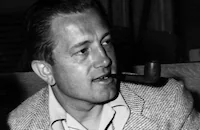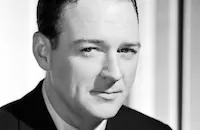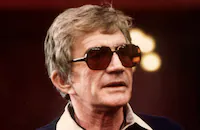Till the End of Time

Brief Synopsis
Cast & Crew
Edward Dmytryk
Dorothy Mcguire
Guy Madison
Robert Mitchum
Bill Williams
Tom Tully
Film Details
Technical Specs

Synopsis
After he is discharged from the Marines, twenty-one-year-old Cliff Harper returns to his home in Los Angeles. At his parents' empty house, Cliff meets his new neighbor, Helen Ingersoll, a vivacious college freshman, who is immediately starstuck by the decorated hero. Anxious to be with friends, Cliff heads for Scuffy's, his favorite pre-war soda shop. At Scuffy's, which has been transformed to a bar, friend and fellow ex-serviceman Pinky introduces Cliff to Pat Ruscomb, and instantly attracted to her, Cliff asks her to dance. In a romantic daze, Cliff abandons Pinky, goes to Pat's apartment and kisses her impetuously. When he professes his passion, however, Pat withdraws from him and talks about her husband, who was killed during the war. Depressed by Pat's mourning, Cliff returns home and is greeted ecstatically by his parents. That night, the Harpers host a barbeque, and Cliff is subjected to a variety of questions about the war. At odds with the prevailing mood of the party, Cliff tries to call Pat, who is out, then cries himself to sleep. The next day, Pinky invites Cliff to go ice skating with him and Pat, and Cliff asks an eager Helen to be his date. In the skating rink café, Cliff and Pat see a lonely soldier shaking from post-traumatic stress disorder and approach him. Cliff commiserates with the veteran, while Pat talks about her own painful past to give him courage. The next morning, Cliff is questioned by his father about his future plans and disappoints him by answering that he is unsure about what he wants to do with his life. Cliff then goes with Helen and platoon mate William Tabeshaw, who has just arrived from New Mexico, where he works as a cowboy, to see Perry Kincheloe, a fellow veteran and former boxer. Though happy to see Cliff and Bill, who has a metal plate in his skull from a war injury, the legless Perry rejects their attempt to cheer him up and politely rejects the advice of Sergeant Gunny Watrous, his discharge officer, to wear his artificial legs. Later, Cliff sees Pat drinking with an army captain at Scuffy's and then fights with his parents, who accuse him of behaving like a stranger. Unhappy and jealous, Cliff passes up the lovesick Helen and waits for Pat's return outside her apartment. After he spies Pat drunkenly kiss the captain goodnight, he calls her a tramp and leaves in a jealous huff. Once calm, Cliff returns to apologize to Pat, who reveals that she went out with the captain only because he was her husband's co-pilot. Ashamed, Cliff comforts Pat and admits that he, too, is lonely and confused. At Pat's suggestion, Cliff then takes an inspection job at the radio factory where she works as a secretary, but soon picks a fight with his supervisor. After another discouraging visit with Perry, Cliff proposes to Pat, but she rejects him for not taking charge of his life. Angry, Cliff goes drinking with Bill, who reveals that he lost his job as a cowhand in New Mexico after the metal plate in his skull began causing him unbearable pain. Concerned about Bill, who refuses to see a doctor, Cliff telephones Perry on the pretext of asking him to invest in a ranch deal that Bill has proposed. By the time that Perry, who finally finds the courage to don his artificial legs, arrives at the bar, however, Cliff has become drunk and is discussing the ranch as a serious proposition. Cliff also telephones Pat and insists that she go with him to New Mexico, but she refuses the offer and tries to talk him out of it. Cliff, Bill and Perry are then approached by a group of men who invite them to join their veterans' organization. When the group's spokesman smugly states that no "Catholics, Jews or Negroes" are admitted to the organization, Bill knocks him out and instigates a brawl. During the mêlée, Perry happily discovers that he can still throw a punch, while Bill is hit on his head and is sent to the hospital. Once Bill's condition has stabilized, Cliff comes to terms with his parents and, after declaring his intention to stay in Los Angeles, reunites with Pat.

Director

Edward Dmytryk
Cast

Dorothy Mcguire

Guy Madison

Robert Mitchum

Bill Williams

Tom Tully

William Gargan

Jean Porter
Johnny Sands
Loren Tindall
Ruth Nelson

Selena Royle
Harry Von Zell

Richard Benedict
Dickie Tyler
Stan Johnson
Billy Newell
Lee Slater
Robert Lowell
Peter Varney
George Burnett
Bill Barnum
Jack Parker
Paul Theodore
Oliver Hinsdell
John S. Roberts
Anthony Marsh
John Bailey
Michael Kostrick
Dick Benjamin
Alan Ward
Bill "red" Murphy
Paul Smith
Drew Allen
Ernest Mishens
Tom Sutherland
Fleet White
Richard X. Slattery
Tim Ryan
Harry Hayden
Margaret Wells
Fred Howard

Ellen Corby
Mary Worth
Teddy Infuhr
Warren Jackson
William Forrest
Arthur Loft
Cindy Garner
Al Murphy
Robert Manning
Paul Stader
Tito Renaldo

Blake Edwards
James Logan
Caleb Peterson
Stubby Kruger
Dick Elliott
Steve Taylor
Alexander Pope
Howard Negley
Jack Lee
Jack Chapman
Warren Smith
Eddie Craven
Crew
C. Bakaleinikoff
Frédéric Chopin
Albert S. D'agostino
Lynn Dunn
Harry Gerstad
Fred Guinn
Leigh Harline
Buddy Kaye
Ted Mossman
Earl B. Mounce
Jack Okey
Edgar Peterson
Clem Portman
Allen Rivkin
Ruby Rosenberg
Dore Schary
Darrell Silvera
William Stevens
Clifford Stine
Charles Straumer
Richard Van Hessen
Vernon L. Walker
William E. Watts
Harry Wild

Videos
Movie Clip



Hosted Intro
Film Details
Technical Specs

Articles
Till the End of Time
In a story similar to that of its more famous cousin, The Best Years of Our Lives (also 1946), Till the End of Time follows three Marines' difficulties in adjusting to a peacetime world. Guy Madison returns home to his parents, who want him to settle down with a job and the girl next door (Jean Porter), but he is more attracted to older war widow Dorothy McGuire. Bill Williams is an ex-boxer who lost both his legs in the war, and Robert Mitchum has plans to buy a ranch that are derailed by a trip to Las Vegas.
The male leads were a trio of young heartthrobs of the time, especially Madison, whose good looks compensated for his acting ability. Director Edward Dmytryk commented on that fact years later, writing, "He was completely without experience, professional or amateur. He simply couldn't act. It didn't seem to bother him any. It was probably just as well. A bad actor was trouble enough. A bad and frightened actor might have made things impossible. I would talk him through a scene, telling him where to look, when to speak, when to walk, when to pause. I felt very Germanic but not very comfortable."
Dorothy McGuire was also a challenge to direct. "If I planned a sitting scene, she wanted to walk," Dmytryk recalled. "If I wanted her to move, she insisted on sitting down. Adopting a risky strategy, I always suggested the opposite of what I really wanted her to do. If she had gone along with me, I would have been up a tree."
Ironically, this was a role that McGuire had lobbied hard to get. She was under contract to David Selznick when she asked him to let her do Till the End of Time at RKO. Selznick thought she was not right for the part but let her do it on one condition - that she do a sequel to Claudia (1943), her film debut and a huge hit. (She had previously refused to do this sequel.) She relented (the sequel was called Claudia and David [1946]) but Selznick turned out to be correct - McGuire really wasn't right for a part which called for her to be somewhat glamorized. She was smart enough to realize this, later recalling, "I asked to do Till the End of Time because she was a character my own age and she was different, even though the part was not a developed one. I fought the hardest for this role and it was my least successful part."
Robert Mitchum's complex performance of inner turmoil masked by outer swagger proved that he was a major, serious actor as well as a star. Dmytryk observed that this quality was true of Mitchum in real life as well. "Mitchum is an unusual man, tough and taciturn on the outside, soft and sentimental on the inside," Dmytryk wrote. He was also greatly impressed by the actor's mimicking skills. "During the San Diego shooting, Mitchum's caricatures and impersonations kept us in stitches, and he was playing to pros. His mastery of all dialects was exceptional - greater even than that of Marlon Brando's."
Till the End of Time was an RKO picture, but it could not have been made without David O. Selznick, who supplied McGuire, Madison, and Mitchum (who was under joint contract to Selznick and RKO). Even producer Dore Schary had just left the Selznick company for RKO. As Dmytryk explained, "Selznick 'owned' some of the biggest stars in Hollywood, but made very few pictures. RKO made the usual major studio's quota of films, but had very few stars. A trade-off was mutually advantageous."
One other contribution that Selznick almost made, but which thankfully fell through, was that of Shirley Temple. Originally cast as the girl next door who pines after Madison, Temple married John Agar and went off on a honeymoon instead. To replace her, Dore Schary suggested Jean Porter from MGM. Dmytryk not only cast her, he fell in love with her. Though he was going through a divorce at the time, it was not yet final, and this was enough for MGM to deny Porter any more work at the studio. They merely lent her out to other studios until her contract was dissolved. In the end, Dmytryk's divorce was finalized, he married Porter, and they were still married when he died 53 years later. As he put it, "what made [the movie] the best year of my life was the presence of Jean Porter - one day to be Jean Porter Dmytryk."
Originally called They Dream of Home, from Niven Busch's novel of the same name, the picture's title was changed well into production when the studio decided to incorporate the Perry Como song "Till the End of Time" into the soundtrack. Based on Chopin's "Polonaise in A Flat Major," the song was a pop hit.
Producer: Dore Schary
Director: Edward Dmytryk
Screenplay: Niven Busch (novel), Allen Rivkin
Cinematography: Harry Wild
Film Editing: Harry Gerstad
Art Direction: Albert S. D¿Agostino, Jack Okey
Music: Leigh Harline, Buddy Kaye, Ted Mossman
Cast: Dorothy McGuire (Pat Ruscomb), Guy Madison (Cliff Harper), Robert Mitchum (William Tabeshaw), Bill Williams (Perry Kincheloe), Tom Tully (C.W. Harper), William Gargan (Sgt. Gunny Watrous).
BW-106m. Closed captioning.
by Jeremy Arnold

Till the End of Time
Quotes
Trivia
Notes
The working titles of this film were They Dream of Home and The Dream of Home. Modern sources note that all of the main characters in Niven Busch's novel were either American Indian or black, and that the only racial incident of the book to be retained in the film was the final bar scene. Hollywood Reporter news items and RKO production files from the UCLA Arts Library-Special Collection add the following information about the production: In May 1945, producer Dore Schary received script approval from two Marine generals assigned to the project. The picture began as a Vanguard Films production, but was taken over by RKO in July 1945 along with Notorious and The Spiral Staircase ( entries). Shirley Temple and Don DeFore were considered for leading roles in the film, and John Lund was tested with Guy Madison for a "top role," but was not cast. Also tested for parts were Chris Drake and twenty-six other "recently discharged servicemen," but their participation in the final film has not been confirmed. Sam Levene was announced as a cast member, but he was not in the viewed print and his participation in the final film is doubtful. RKO borrowed Johnny Sands, who made his screen debut in the picture, Dorothy McGuire and Guy Madison from David Selznick's company. Steve Dunhill, Howard Negley and Deborah Allen, who was publicized as a recent high school graduate and beauty contest winner, were announced as cast members, but their participation in the final film has not been confirmed. Some scenes for the production were shot at the San Diego Marine Base, in Beverly Hills and Sawtelle, CA (now a part of West Los Angeles), the Westwood Ice Gardens, and at Vermont Avenue and 4th Street and the Packard-Bell plant on Wilshire Boulevard in Los Angeles. RKO purchased the film rights to the title and title song for $15,000. Robert Mitchum reprised his role in a Lux Radio Theatre broadcast on January 6, 1947, co-starring Laraine Day and Bill Williams.















